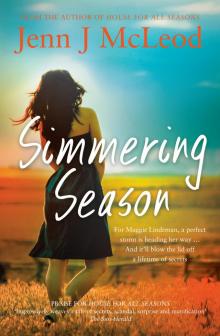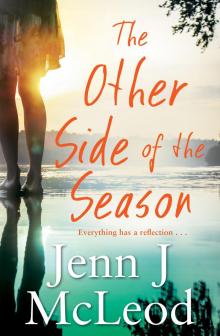- Home
- Jenn J. McLeod
House for All Seasons Page 2
House for All Seasons Read online
Page 2
‘Of course! He said he would, didn’t he.’
Amber cut in. ‘Well, it’s a damn shame your Mr Macho Football Hero with the big muscles can’t hang the thing while he’s at it.’
Sara slammed her hands on both hips, the yellow sun frock she wore making her look like a little yellow bird fluffing up in defence. ‘As well as school and football, he has a job, you know. We don’t all have a father to manipulate and get us what we want when we want it, Amber.’
‘Another job? You mean besides looking good?’
‘You should talk, Miss Perfectly Pruned Eyebrows.’
‘Sara, Amber, for goodness sake. Don’t you ever stop?’ Caitlin shook her head in disbelief.
‘What banner?’ Willow asked, blinking into the sun.
‘It’s our Calingarry Class of ’89 farewell sign,’ Poppy said. ‘We recycled the big yellow banner from the school fete a few years back. Once we get every student’s signature we’re going to hang it on the bridge down by the swimming hole.’
‘I can help.’
‘Hardly! Not with that gammy leg.’ Amber’s eyes dropped to the built-up shoe and brace Willow wore to minimise her limp. ‘And you can’t sign it, either. You don’t go to the school.’
‘That’s enough, Amber.’ Poppy hurdled the fence effortlessly, landing beside Willow.
‘Tell her I’m part of the group, Poppy.’
‘It’s prob’ly best you stay home today, Willow,’ Poppy said in a low voice so the others, now making their way through the school gate, wouldn’t hear. ‘I won’t be able to watch out for you.’
‘I don’t need looking after.’
‘I know … I didn’t mean … Look, I’m doing the paper delivery for Mr Hilt tomorrow. I’ll bring a paper over to your house when I’m done. Your mum likes it when I read to her. I can tell you all about the day then.’ Regret ground Poppy’s voice flat. ‘We really have to get going now. See you tomorrow. Okay?’
‘Poppy? Sara? You coming or what?’ Amber demanded.
‘Coming. Coming.’ Poppy turned in the direction of home. ‘This way, everyone. We’re going to need extra rope and marker pens. I have some in my room.’
The four of them walked away, leaving Willow behind, her smaller than normal figure—stunted by illness and pain—slowly disappearing from view, disappearing from their thoughts.
*
In the thirteenth-floor office suite, four grown-up women sat in silence. If only one of them had seen the signs that day. Poppy had ignored the shimmering veil of early tears in Willow’s eyes. She’d missed the determination behind them, the look that said this girl had had enough of being the odd one out.
If only.
Poppy felt the sting of her own tears and blinked them back. ‘So then …’ She rubbed a hand over the hidden nicotine patch on her arm three times, as if it was a magic lamp. She sure could do with a cigarette right now.
Three wishes wouldn’t go astray either.
She’d settle for one wish—to be out of this room and occupying her thoughts with work. Somehow, a war zone seemed preferable to the guilty silence in the conference room.
‘Where is this Mr Madgick, anyway?’ she said. ‘Wasn’t he supposed to be meeting us here thirty minutes ago?’
‘Yes, and we …’ Sara’s index finger circled the room, tagging each of them, ‘… we are supposed to have worked out when we’ll be at the house. So let’s at least look at some dates.’ She thumbed the pages of her pocket diary.
‘I’m sure I can work a stay in somewhere soon,’ Amber said, opening her black leather Filofax on her knees.
Poppy and Caitlin were both tapping at their smartphones when the door to the conference room opened.
‘Good afternoon, ladies.’ The woman’s voice was as ethereal as her appearance: skin ivory, hair ebony, eyes cerulean, but with lips blood red. She stood just inside the door, her hands clasped as if in prayer.
‘You’re not—’
‘Mr Madgick sends his apologies.’ Not waiting for Poppy to finish, the woman glided over to the conference table and tidied the glasses and water jug into a more acceptable formation. ‘I’m Jesamiah Huckenstead, his associate.’
‘You have got to be kidding,’ Poppy muttered through still lips. She’d never seen anyone wear so much mauve. Jesamiah looked—and smelled—like a life-size lavender bag.
‘I assume you’ve all read and understood the conditions of the inheritance?’ the woman asked, ignoring Poppy’s aside.
Caitlin answered first.
Of course she did.
Caitlin always had the answer. Always the first one with her hand up in class, and always right.
‘As I understand the will, Gypsy wants each of us to stay a season at the Dandelion House.’
‘The Dandelion House?’ Jesamiah’s deliberately drawn eyebrows arched in a half-mocking, half-confused expression.
‘That’s what we called it when we were kids,’ Caitlin clarified. ‘We’re also being asked, at least until we’ve each had time to consider our options, not to contact or try to influence each other.’
‘Won’t be too hard,’ Amber mumbled, inspecting the chip on one French-polished fingernail.
Caitlin continued. ‘After that I’m not sure.’
‘All will become clear in time,’ the woman reassured them.
‘No time like the present,’ Poppy said. ‘What’s the catch? Why did Gypsy leave us the old house?’
Jesamiah looked at Poppy, her smile warm but verging on the kind a mother gives a child who says something inappropriate in public. ‘There’s no catch, Ms … ah … Hamilton, isn’t it?’
‘Yes. Poppy Hamilton.’ Poppy’s hand searched for her press ID, thinking her name must be on display. She found it, not hanging on a lanyard around her neck as usual, but secure and out of sight in her pants pocket.
‘Perhaps you can start with spring, Ms Hamilton?’
‘Ah, well, we’re still discussing some of the details. I’m not sure I can at all.’
‘The instructions are quite straightforward.’ So was the tone in Jesamiah’s voice. ‘The terms and conditions are not negotiable. It’s all of you or nothing. I cannot stress this too firmly.’
‘We all understand,’ Sara said with a rare show of authority, followed by a quick sideways glance at the others. ‘Poppy, you know if one refuses it will affect all of us, and whatever her reasons, Gypsy wanted us to do this.’
‘Why? It’s been years. It’s just an old house, for God’s sake.’
‘How can you, of all people, say that?’ Sara sounded like a mother, although she wasn’t one, not unless you counted the years she’d nursed her dementia-afflicted father. ‘Stop acting like you don’t care. Am I the only one here willing to admit how important Gypsy and the house were to each of us back then—you more than anyone, Poppy.’
‘But after what happened to Willow, I—’
‘You weren’t to blame. None of us were.’ Sara scanned the room. Shy Sara Fraser who once had said very little now sounded strong, her words as impassioned as their delivery. ‘The only thing we’re guilty of is forgetting. Going back can fix that.’
In a way, she was right. Poppy had shut the memory of that day from her mind. Worse still, she’d shut out Gypsy afterwards. She’d done the same thing Johnno had done to her: walked away when she should have stayed, forgotten when she should have remembered. Only Poppy hadn’t walked. She’d run.
Poppy Hamilton was still running, and always away from Calingarry Crossing, which suddenly seemed suffocatingly close. The town was hardly the edge of the outback or a scorched desert, nor was it like the lush picturesque towns of the New South Wales coast. Once nothing more than a midway watering hole to break a tired stockman’s journey, an inland settlement had slowly grown out of the dusty plains. Too small to be called a town, even too small for its own postcode for a long time, a river meandered through its heart. That lazy Calingarry River gave the town a future.
‘Very w
ell.’ Jesamiah handed each woman a card. ‘I’ll let you decide. There will be further correspondence prior to each stay. In the meantime, you can reach me or Mr Madgick on this number.’
The women each took a business card. It read:
Madgick & Associates—Trust Managers
In Madgick we trust
‘If there are no more questions, I wish you—Poppy Hamilton, Sara Fraser, Amber Bailey and Caitlin Wynter—a good afternoon and a very good season.’
SPRING/SUMMER
Surviving Summer
2
There he was, Will Travelli; still the perfect torso of broad shoulders tapering to a narrow waist, sculpted face, errant eyes and that smile … Another very good reason for coming back to the country.
Sara hesitated on the far side of Calingarry Crossing’s main street, coming to terms with the man he was today, not to mention the woman she was after battling the worst two years of her life, topped off by the worst day. She’d survived since by taking one small step at a time.
Now, if only you can manage one foot in front of the other across that road. She couldn’t stand on the pavement all day. Despite the afternoon heat, a memory had her frozen in place, unable to muster the courage to take the first step. She was back in the once cosy kitchen nook—the place of shared breakfasts, shared dreams and shared futures.
The end had seemed too easy: three abandoned keys on the kitchen table, two final words, one suitcase by the front door. A bitter chill numbed Sara that morning, wringing the last elusive tears from the well she thought had dried up long ago. Her husband was walking away when she needed him the most. Leaving her for someone else, someone younger, someone whole.
Sara had since sworn off men altogether. Betsy had helped make that decision easy, but Sara was yet to find the courage to tell anyone about Betsy.
Come on, Sara, suck it up. No one knows unless you tell.
Engage mask. Check.
Lift chin. Check.
Shirt buttons, jean zipper, hair. Check. Check. Check.
‘You’re all grown up now. You can do this,’ she mumbled, sucking in her stomach, putting a little sass in her step and making a beeline for the café across the street.
‘Well looky at what the summer breeze just blew in. Sara Fraser! Is that really you? How long’s it been?’
‘I’m fine, thank you, Will. How are you?’ The forced salutation snagged in her throat. So much for rehearsing. He hadn’t even asked how she was.
Checking her enthusiasm at the door to the café had made her sound more stilted and unnatural than she’d planned, the raspy whisper verging on uppity slutty—if there was such a thing as uppity slutty. But at least that question was out of the way. Hopefully he wouldn’t ask how she was for real.
‘I can’t believe my eyes. You look bloody amazing, Sara.’
She managed a smile, albeit a guarded one, hugging her small tan leather handbag to her chest as if it was helium filled and about to float away.
‘You look pretty good too.’
Argh! She obviously hadn’t forgotten to pack an arsenal of perfunctory platitudes.
‘Oh, shucks, me?’ Will whooped and slapped both hands on his wheelchair, before two powerful arms propelled him closer. ‘In this old thang?’
If she looked beyond the scars, back before the accident, back to his high school football days, he still looked like the same Will, and too darn good-looking.
‘The same old Will, I see,’ she said, instantly regretting the ill-chosen cliché, compounded by her reflexive glance at his once powerful legs, now withered.
It must have been obvious. It felt obvious.
Doing well, Sara! The same pathetically shy schoolgirl you always were.
‘I should shout you a coffee. How do you like it?’
‘Um … hot,’ Sara said, uncertain if she was referring to the coffee, the weather, or the temperature of her cheeks.
‘Hot, eh? My, my, little Sara Fraser likes it hot. Now that’s something I never knew.’
‘Sorry, Will, bad habit of mine. You have to stress hot in the city these days. Some places have absolutely no idea how to make a decent long black.’ And there she was being all uppity slutty again.
‘Hey, you’ve definitely come to the right place for coffee, although I do pretty well have the market share in town. We have a motto here.’ He pointed to the promotional umbrella printed with the words Life’s too short to drink bad coffee. ‘So one hot caffeine hit coming up.’ Will guided his chair up a purpose-built ramp to position himself behind the shiny red coffee machine. ‘Bloody oath, it’s good to see you, Sara. I get to introduce you to the woman who wakes me and makes me smile every morning. The one I’ve discovered I could never live without.’
‘Oh.’ Sara’s stranglehold on her handbag wore out, along with her smile. Deflated, disappointed. A woman! Her shoulders drooped and she sighed resignedly. Not unexpected.
‘Beauty, isn’t she?’ Will’s grin deepened, and he stroked the side of the espresso machine as he would a faithful stead. ‘I’m talking about Big Bertha here, of course. Was just getting ready to clean her!’ he yelled over the buzz of the coffee grinder.
‘Oh, of course.’ Sara inched inside the near-empty café and checked her watch. The café’s closing time was the only thing she hadn’t included on her checklist.
After dispensing a quantity of ground beans, Will tamped the coffee down hard until the veins in his arms and neck stood out. ‘So how do you like the old milk bar now? You worked here for a while after school, didn’t you?’
Sara smiled, nodded, breathed, maybe for the first time since her hello.
So far, so good.
Things were going okay. She’d been in town less than fifteen minutes and already she could tick off Item 1 on THE LIST: Do something brave every day.
‘Looks different to when Nick the Greek ran it as a takeaway, that’s for sure,’ she said, turning a slow circle to scan the shop.
She’d read about Will buying the old milk bar after his accident, but she hadn’t expected this revamped version, with trendy spotlighting and stainless-steel countertops. Not in Calingarry Crossing. Gone were the colourful plastic milk crates stacked in the corner and the lolly counter where she would make up her own one-dollar pick-mix bag—part of her pay packet each week—saving all the soft, not too chewy sweets for her parents. The ice-cream freezer was also gone, the one with the frosty sliding doors where she wrote her name, and the name of a certain boy, before opening the doors and allowing the letters to frost over before anyone saw them.
In place of the old vinyl-covered booths and laminated table-tops was a long bench seat running the length of one wall, a dozen or more multicoloured scatter cushions making ad hoc backrests. By the door, a cane basket was filled to overflowing with old magazines. Without thinking, Sara bent down to pick up a stray newspaper that had slipped to the floor, the automatic action jerking her memory back to that morning six years ago.
*
Joel had just dropped her off at work and agreed to meet her early to eat at the newly opened restaurant Sara had wanted to try. They kissed, said ‘I love you’ in unison—laughing over it as usual—then Sara waved him off, his BMW disappearing into the crush of Sydney commuter traffic.
Sara had stopped to flip the shop-door sign from CLOSED to OPEN.
‘Gooooood morning, Irene!’ Sara chirruped, stooping to pick up one of the morning newspapers that had slipped from the day’s delivery onto the floor. She only caught a snippet of the headline at first glance, her eyes drawn to the tiny photograph insert, then the story. The words ‘football superstar in horror crash’ slammed into her chest with the force of ten fists, making her hands tremble so that focusing on the small print was impossible.
For years, Sara had been learning about Will’s life the same way as everyone else—she could read the newspapers, hear the gossip, see the television coverage. But this …
‘Are you okay, Sara?’ Irene Dunst dragged a
chair behind her, lowering Sara slowly, easing her down with two hands under her arms just in case. ‘That’s awful, isn’t it? Do you know Will Travelli?’ she asked.
Sara thought she nodded, only her head felt strangely disconnected from her body, just like her tongue felt disconnected from her brain.
‘Maybe some water, please,’ was all Sara managed, needing a moment alone to fall apart. Bad things didn’t happen to people like Will Travelli. They only happened to Sara—or so she thought.
In the days that followed, anyone who could read learned every tragic detail of Will’s accident. Media coverage of the car crash that had shocked the New South Wales football fraternity was unrelenting. Journalists swooped on the story, like crows to a rotting carcass, although how much was fact and how much was fiction Sara couldn’t know. For a while Will and his beautiful wife Ebony were big, big news. Woman’s Day even did a two-page feature story. For a week or more, everyone was all over it, every distressing detail of Will’s loss, the ordinary bloke in the street able to witness a man’s life fall apart—reality TV at its very worst. Even Sara’s staff discussed the detail over coffee as if it was nothing more than a TV soap opera.
Back in that awful moment, she heard Irene ask her ‘Are you sure you’re all right? Is there something …’
*
‘Something more interesting in that newspaper than me, Sara?’ Will was staring, a curious grin upping Sara’s temperature. ‘You okay?’
‘Sure, yes, fine.’ She dropped the newspaper on the stack and returned her attention to the man behind the coffee machine.
Knowing Will was now back home in Calingarry Crossing had made Sara’s decision to return an easy one, despite her denial when Poppy and Amber had tried to rile her. All three friends had done their share of teasing Sara about her crush on Will throughout school. They hadn’t so much poked fun at her infatuation—every female student had been obsessed with Will—but at her willingness to settle for friendship when what she’d really wanted, in Amber’s words, was a roll in the …

 A Place to Remember
A Place to Remember Simmering Season
Simmering Season Season of Shadow and Light
Season of Shadow and Light House for All Seasons
House for All Seasons Other Side of the Season
Other Side of the Season